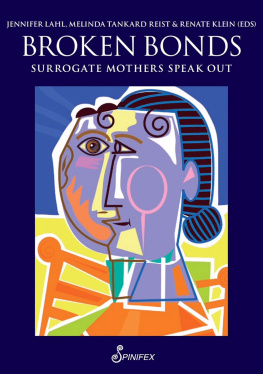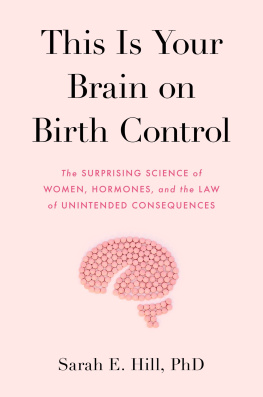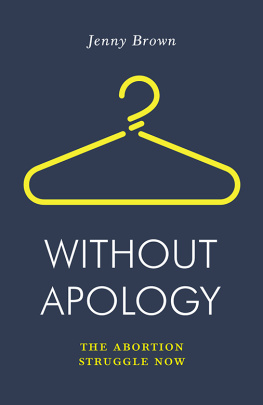RENATE KLEIN, PhD, was Associate Professor in Womens Studies at Deakin University, Melbourne, until her retirement in 2006, and is the (co)author/(co)editor of 14 books. She is a biologist and social scientist and taught courses on Reproductive Medicine and Feminist Ethics. Since the 1980s, she has conducted critical feminist research into the new and old reproductive technologies including international population control, IVF (fertility drugs), hormonal and immunological contraceptives, surrogacy, RU 486 and Gardasil.
JANICE G. RAYMOND, PhD, is Professor Emerita of Women's Studies and Medical Ethics at the University of Massachusetts in Amherst and was Associate Director of the Institute on Women and Technology at MIT. She was also the Co-Executive Director of the Coalition Against Trafficking in Women (CATW) from 1994 to 2007. She has written extensively on new reproductive technologies, prostitution and trafficking. Her latest book is Not a Choice, Not a Job: Exposing the Myths about Prostitution and the Global Sex Trade (Potomac, Virginia, USA/Spinifex Press, Melbourne, 2013).
LYNETTE J. DUMBLE, PhD, was the Senior Research Fellow in the University of Melbournes Department of Surgery at the Royal Melbourne Hospital and Visiting Professor of Surgery at the University of Texas, Houston, USA. She has published extensively in medical and scientific journals in the areas of transplantation, immunosuppression (including prostaglandins), and medical ethics. Since 1997 she has directed the Global Sisterhood Network. Her latest book is The Social & Political Economies of Femicide in Andhra Pradesh (with Rukmini V. Rao, Gramya Resource Centre for Women, Tarnaka, India, 2012).
RU 486
MISCONCEPTIONS
MYTHS AND
MORALS
Renate Klein
Janice G. Raymond
Lynette J. Dumble
with a new Preface by Renate Klein
Spinifex Press Pty Ltd,
504 Queensberry Street,
North Melbourne, Vic. 3051
Australia
http://www.spinifexpress.com.au
First published by Spinifex Press, 1991
New edition published 2013
Copyright Renate Klein, Janice G. Raymond, Lynette J. Dumble, 1991, 2013.
Copyright Preface to this edition, Renate Klein, 2013.
All rights reserved. Without limiting the rights under copyright reserved above, no part of this publication may be reproduced, stored in or introduced into a retrieval system, or transmitted, in any form or by any means (electronic, mechanical, photocopying, recording or otherwise), without prior written permission of both the copyright owner and the above publisher of the book.
Typeset in 11/13 pt New Baskerville by Claire Warren,
Printed by McPhersons Printing Group
National Library of Australia
Cataloguing-in-Publication entry:
CIP
Klein, Renate.
RU 486: misconceptions, myths and morals.
2nd edition
Previous edition: 1991
ISBN 97817 4219 8408 (pbk)
97817 4219 8446 (ePub)
97817 4219 8422 (Mobi)
Includes bibliographical references and index.
1. Mifepristone. 2. Abortifacients. 3. Abortion.
I. Raymond, Janice G. II. Dumble, Lynette J. (Lynette Joyce), 1946. III. Title.
618.29
The steroid mifepristone, best known as the abortion pill RU 486, made its debut in 1988 in France. Janice Raymond, Lynette Dumble and I all long-term womens health researchers and supportive of safe, legal abortion watched in astonishment as international womens health groups uncritically greeted the arrival of this chemical abortifacient. We wondered why a largely untested chemical was hailed as a new miracle drug and the moral right of women, as its French inventor, Etienne-Emile Baulieu, liked to call it. We already had a tried and tested abortion method suction abortion (also called vacuum aspiration) which can be undertaken using a local anesthetic. It is performed in the safety of a clinic, completed in 510 minutes, and is 9899% effective.
When we noticed suction abortion increasingly being called surgical abortion (although no cutting is involved), and the pill abortion RU 486 medical abortion and termed safe, effective, quick and more natural we knew we had to investigate the science as well as the politics of chemical abortion our preferred term. We wondered how a procedure could be called quick in spite of the fact that it can take more than 6 weeks (45 days) to be completed. We also learnt that RU 486 abortion wasnt just a simple one stop pill abortion: it requires the addition of a second chemical, a prostaglandin (PG), to boost its success rate to the low 90% (sometimes less). When we found out that the most frequently used prostaglandin, a misoprostol marketed under the trade name Cytotec (an anti-gastric ulcer drug), had been dis-endorsed for abortion purposes by its manufacturer, alarm bells began to ring.
We were particularly concerned when we realized that any questions or criticism of RU 486/PG abortion were immediately condemned. For example, in an article on The politics of the abortion pill (Chapman, 1989), International Planned Parenthood Vice President Louise Tyrer stated that such criticism was signing the death warrant for the 200,000 women who die [worldwide] annually from abortion. Criticism was often perceived as emanating from anti-abortionists. But as we saw it, the real problems were that abortion was still illegal in many countries, and that relations between women and men remained unequal; big issues that can not be solved by a new abortion method.
After painstaking research for two years, we did not like what we found. We became convinced that not only was RU 486/PG abortion not a new panacea, but that in fact its potential widespread (and in many countries illegal) use might jeopardize womens lives and become the new DIY backyard abortion, 21st-century style.
We called the results of our research RU 486: Misconceptions, Myths and Morals to draw attention to the various discourses around this chemical drug cocktail. In 1991, our book was published simultaneously in the USA, Australia and Bangladesh (and distributed in Europe and New Zealand). It was awarded a Certificate of Commendation in the 1991 Australian Human Rights Awards. This was reaffirming of our aim to shed light on the wild claims for this new abortion method; the reality of company-sponsored research that led to its rapid approval in France and the UK; adverse effects, dangers and unknown long-term effects of RU 486/PG; and its potential for abuse of women in the so-called Third World as part of the ongoing quest by the west for population control.
Regrettably, the majority of the womens health movement, especially in the USA, and among US-influenced pro-choice and pro-population control groups in Australia and the UK, saw us as traitors to the cause of womens struggle for abortion rights, and/or as anti-abortionists in disguise and in bed with anti-abortion groups who mostly welcomed the findings of our book.
We found out the hard way (by being ignored and treated as pariahs at US conferences or even shouted down) that asking tough questions about chemical abortion, in other words, taking the publicity gloss off the repeated but unproven safe-and-effective mantra, was not welcomed by womens health groups. They preferred the simplistic notion that popping some pills was the solution to pregnancy termination that we had all been waiting for. The reception of our work in continental Europe was much more positive (our book was published in German in 1992) as many womens health advocates were concerned about RU 486/PG abortion. And many Indian health activists applauded our work.









